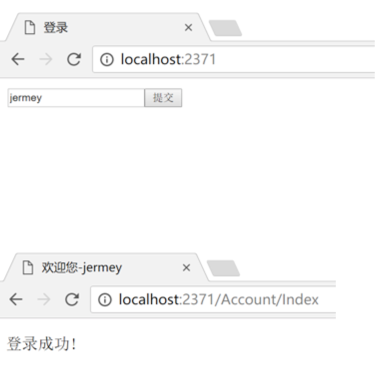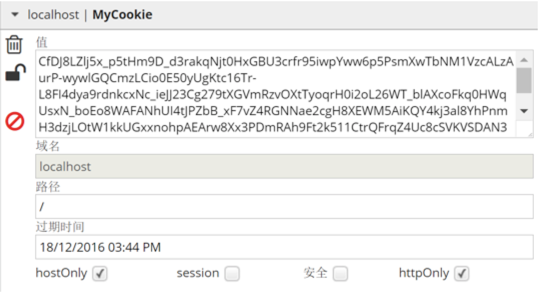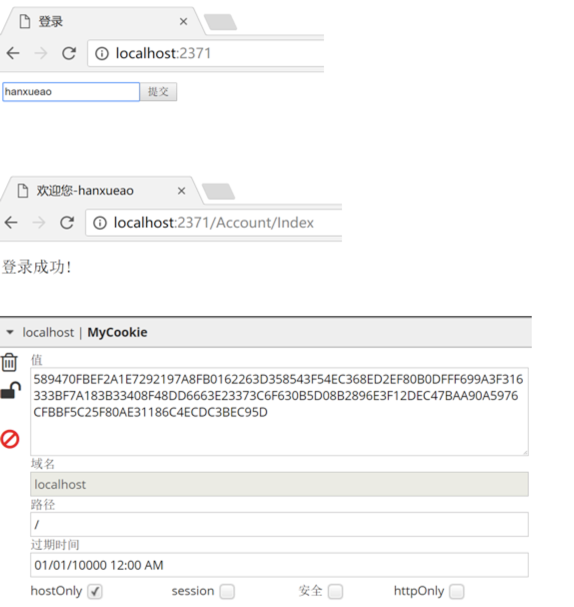.NET Core 已經熱了好一陣子,1.1版本發布後其可用性也越來越高,開源、組件化、跨平台、性能優秀、社區活躍等等標簽再加上“微軟爸爸”主推和大力支持,盡管現階段對比.net framework還是比較“稚嫩”,但可以想象到它光明的前景。作為.net 開發者你是否已經開始嘗試將項目遷移到.net core上?這其中要解決的一個較大的問題就是如何讓你的.net core和老.net framework站點實現身份驗證兼容!
1、第一篇章
我們先來看看.net core中對identity的實現,在Startup.cs的Configure中配置Cookie認證的相關屬性
public void Configure(IApplicationBuilder app, IHostingEnvironment env)
{
app.UseCookieAuthentication(new CookieAuthenticationOptions
{
AuthenticationScheme = "test",
CookieName = "MyCookie"
});
}
Controller
public IActionResult Index()
{
return View();
}
public IActionResult Login()
{
return View();
}
[HttpPost]
public async Task<IActionResult> Login(string name)
{
var identity = new ClaimsIdentity(
new List<Claim>
{
new Claim(ClaimTypes.Name,name, ClaimValueTypes.String)
},
ClaimTypes.Authentication,
ClaimTypes.Name,
ClaimTypes.Role);
var principal = new ClaimsPrincipal(identity);
var properties = new AuthenticationProperties { IsPersistent = true };
await HttpContext.Authentication.SignInAsync("test", principal, properties);
return RedirectToAction("Index");
}
login 視圖
<!DOCTYPE html>
<html>
<head>
<title>登錄</title>
</head>
<body>
<form asp-controller="Account" asp-action="Login" method="post">
<input type="text" name="name" /><input type="submit" value="提交" />
</form>
</body>
</html>
index 視圖
<!DOCTYPE html> <html> <head> <title>歡迎您[email protected]</title> </head> <body> @if (User.Identity.IsAuthenticated) { <p>登錄成功!</p> } </body> </html>
下面是實現效果的截圖:


ok,到此我們用.net core比較簡單地實現了用戶身份驗證信息的保存和讀取。
接著思考,如果我的.net framework項目想讀取.net core項目保存的身份驗證信息應該怎麼做?
要讓兩個項目都接受同一個Identity至少需要三個條件:
首先我們對.net core的Cookie認證添加domain屬性和ticket屬性
public void Configure(IApplicationBuilder app, IHostingEnvironment env)
{
var protectionProvider = DataProtectionProvider.Create(new DirectoryInfo(@"C:\keyPath\"));
var dataProtector = protectionProvider.CreateProtector("MyCookieAuthentication");
var ticketFormat = new TicketDataFormat(dataProtector);
app.UseCookieAuthentication(new CookieAuthenticationOptions
{
AuthenticationScheme = "test",
CookieName = "MyCookie",
CookieDomain = "localhost",
TicketDataFormat = ticketFormat
});
}
此時我們在.net core 項目中執行用戶登錄,程序會在我們指定的目錄下生成key.xml

我們打開文件看看程序幫我們記錄了那些信息
<?xml version="1.0" encoding="utf-8"?>
<key id="eb8b1b59-dbc5-4a28-97ad-2117a2e8f106" version="1">
<creationDate>2016-12-04T08:27:27.8435415Z</creationDate>
<activationDate>2016-12-04T08:27:27.8214603Z</activationDate>
<expirationDate>2017-03-04T08:27:27.8214603Z</expirationDate>
<descriptor deserializerType="Microsoft.AspNetCore.DataProtection.AuthenticatedEncryption.ConfigurationModel.AuthenticatedEncryptorDescriptorDeserializer, Microsoft.AspNetCore.DataProtection, Version=1.1.0.0, Culture=neutral, PublicKeyToken=adb9793829ddae60">
<descriptor>
<encryption algorithm="AES_256_CBC" />
<validation algorithm="HMACSHA256" />
<masterKey p4:requiresEncryption="true" xmlns:p4="http://schemas.asp.net/2015/03/dataProtection">
<value>yHdMEYlEBzcwpx0bRZVIbcGJ45/GqRwFjMfq8PJ+k7ZWsNMic0EMBgP33FOq9MFKX0XE/a1plhDizbb92ErQYw==</value>
</masterKey>
</descriptor>
</descriptor>
</key>
ok,接下來我們開始配置.net framework項目,同樣,在Startup.cs中配置Cookie認證的相關屬性。
public partial class Startup
{
public void Configuration(IAppBuilder app)
{
var protectionProvider = DataProtectionProvider.Create(new DirectoryInfo(@"C:\keyPath\"));
var dataProtector = protectionProvider.CreateProtector("MyCookieAuthentication");
var ticketFormat = new AspNetTicketDataFormat(new DataProtectorShim(dataProtector));
app.UseCookieAuthentication(new CookieAuthenticationOptions
{
AuthenticationType = "test",
CookieName = "MyCookie",
CookieDomain = "localhost",
TicketDataFormat = ticketFormat
});
}
}
view
<!DOCTYPE html> <html> <head> <title>.net framewor歡迎您[email protected]</title> </head> <body> @if (User.Identity.IsAuthenticated) { <p>.net framework登錄成功!</p> } </body> </html>
寫法和.net core 基本上是一致的,我們來看下能否成功獲取用戶名:

反之在.net framework中登錄在.net core中獲取身份驗證信息的方法是一樣的,這裡就不重復寫了。
然而,到此為止事情就圓滿解決了嗎?很遺憾,麻煩才剛剛開始!
--------------------------------------------------------------------------------
2、第二篇章
如果你的子項目不多,也不復雜的情況下,新增一個.net core 站點,然後適當修改以前的.net framework站點,上述實例確實能夠滿足需求。可是如果你的子站點足夠多,或者項目太過復雜,牽扯到的業務過於龐大或重要,這種情況下我們通常是不願意動老項目的。或者說我們沒有辦法將所有的項目都進行更改,然後和新增的.net core站點同時上線,如果這麼做了,那麼更新周期會拉的很長不說,測試和更新之後的維護階段壓力都會很大。所以我們必須要尋找到一種方案,讓.net core的身份驗證機制完全迎合.net framwork。
因為.net framework 的cookie是對稱加密,而.net core是非對稱加密,所以要在.net core中動手的話必須要對.net core 默認的加密和解密操作進行攔截,如果可行的話最好的方案應該是將.net framework的FormsAuthentication類移植到.net core中。但是用reflector看了下,牽扯到的代碼太多,剪不斷理還亂,github上也沒找到其源碼,瞎忙活了一陣之後終於感慨:臣妾做不到(>﹏< )。
Cookie認證的相關屬性
app.UseCookieAuthentication(new CookieAuthenticationOptions
{
AuthenticationScheme = "test",
CookieName = "MyCookie",
CookieDomain = "localhost",
TicketDataFormat = new FormsAuthTicketDataFormat("")
});
FormsAuthTicketDataFormat
public class FormsAuthTicketDataFormat : ISecureDataFormat<AuthenticationTicket>
{
private string _authenticationScheme;
public FormsAuthTicketDataFormat(string authenticationScheme)
{
_authenticationScheme = authenticationScheme;
}
public AuthenticationTicket Unprotect(string protectedText, string purpose)
{
var formsAuthTicket = GetFormsAuthTicket(protectedText);
var name = formsAuthTicket.Name;
DateTime issueDate = formsAuthTicket.IssueDate;
DateTime expiration = formsAuthTicket.Expiration;
var claimsIdentity = new ClaimsIdentity(new Claim[] { new Claim(ClaimTypes.Name, name) }, "Basic");
var claimsPrincipal = new ClaimsPrincipal(claimsIdentity);
var authProperties = new Microsoft.AspNetCore.Http.Authentication.AuthenticationProperties
{
IssuedUtc = issueDate,
ExpiresUtc = expiration
};
var ticket = new AuthenticationTicket(claimsPrincipal, authProperties, _authenticationScheme);
return ticket;
}
FormsAuthTicket GetFormsAuthTicket(string cookie)
{
return DecryptCookie(cookie).Result;
}
async Task<FormsAuthTicket> DecryptCookie(string cookie)
{
HttpClient _httpClient = new HttpClient();
var response = await _httpClient.GetAsync("http://192.168.190.134/user/getMyTicket?cookie={cookie}");
response.EnsureSuccessStatusCode();
return await response.Content.ReadAsAsync<FormsAuthTicket>();
}
}
FormsAuthTicket
public class FormsAuthTicket
{
public DateTime Expiration { get; set; }
public DateTime IssueDate { get; set; }
public string Name { get; set; }
}
以上實現了對cookie的解密攔截,然後通過webapi從.net framework獲取ticket
[Route("getMyTicket")]
public IHttpActionResult GetMyTicket(string cookie)
{
var formsAuthTicket = FormsAuthentication.Decrypt(cookie);
return Ok(new { formsAuthTicket.Name, formsAuthTicket.IssueDate, formsAuthTicket.Expiration });
}
有了webapi這條線,解密解決了,加密就更簡單了,通過webapi獲取加密後的cookie,.net core要做的只有一步,保存cookie就行了
[HttpPost]
public async Task<IActionResult> Login(string name)
{
HttpClient _httpClient = new HttpClient();
var response = await _httpClient.GetAsync($"http://192.168.190.134/user/getMyCookie?name={name}");
response.EnsureSuccessStatusCode();
string cookieValue = (await response.Content.ReadAsStringAsync()).Trim('\"');
CookieOptions options = new CookieOptions();
options.Expires = DateTime.MaxValue;
HttpContext.Response.Cookies.Append("MyCookie", cookieValue, options);
return RedirectToAction("Index");
}
webapi獲取cookie
[Route("getMyCookie")]
public string GetMyCookie(string name)
{
FormsAuthentication.SetAuthCookie(name, false);
return FormsAuthentication.GetAuthCookie(name, false).Value;
}
其余代碼不用做任何更改,ok,我們來測試一下

ok,登錄成功,至此完成.net framework和.net core身份驗證的兼容,哎,如果.net core 的團隊能多考慮一些這方面的兼容問題,哪怕是一個折中方案也能讓開發者更有動力去做遷移。
以上就是本文的全部內容,希望對大家的學習有所幫助,也希望大家多多支持腳本之家。